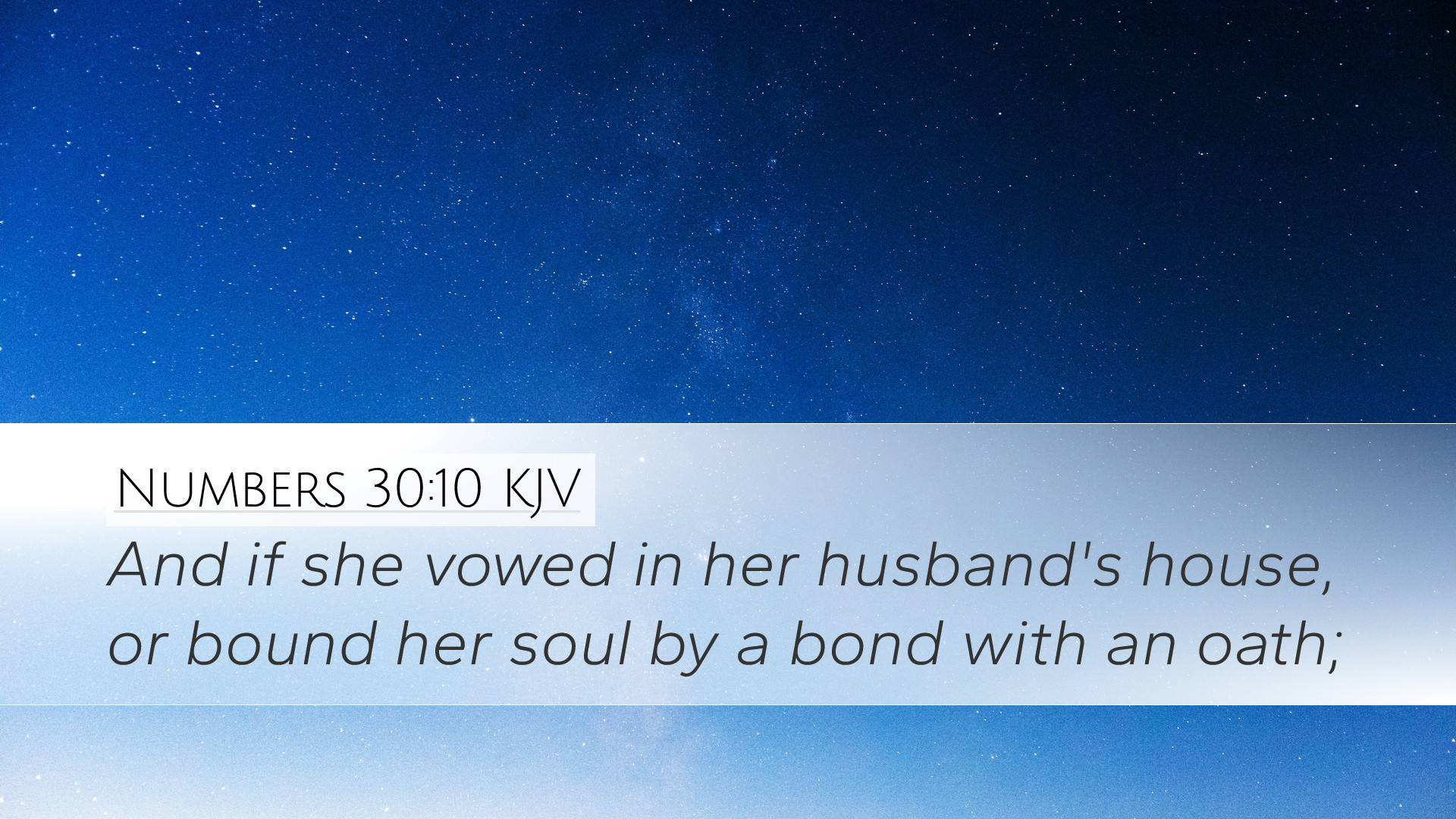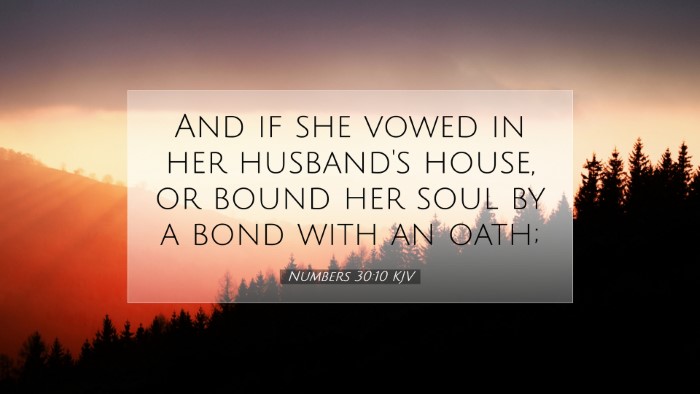Commentary on Numbers 30:10
Text of Numbers 30:10 (KJV): "And if she vowed in her husband's house, or bound her soul by a bond with an oath;."
Introduction
The verse from Numbers 30:10 introduces significant theological insights related to the vows and oaths made by women, particularly in the context of marriage. This passage is part of a broader discussion in the Book of Numbers regarding the responsibilities and regulations surrounding vows made to God by individuals. The nuances of this particular verse are particularly fruitful for exploration, especially when considering the cultural and historical context in which it was written.
Exegesis and Theological Implications
In analyzing Numbers 30:10, it is essential to understand the setting and implications of the vows discussed. Matthew Henry emphasizes the critical aspect of a woman's vows within her husband's household, indicating a structure of authority and the importance of marital relationships in covenantal obligations.
Albert Barnes highlights that a woman's vow, once she enters into marriage, is held under the authority of her husband. This can prompt substantial reflection on the balance of autonomy and submission within biblical frameworks. The obligations a wife takes on through her vows must also reflect the responsibilities her husband bears, indicating a mutual accountability, albeit with clear lines of authority.
Cultural Context
In the ancient Near Eastern context, the structure of family and community was patriarchal, and the dynamics of marriage were deeply interconnected with societal norms. Adam Clarke notes that the wife’s vow assumes a certain level of protection and care from her husband. This reflects broader themes of interdependence in biblical communities and can inform modern discussions surrounding gender roles and marital responsibilities.
Authority and Vow-Taking
This verse raises questions around the nature of authority in the context of spiritual commitments. The notion that a husband's presence or opinion could annul his wife's vow (as elaborated in surrounding verses) necessitates a discussion of how authority operates within marriage. Here, Matthew Henry points out that the husband, as the head of the household, has a significant role in his wife's vow commitments, bringing to light both the dignity and potential limitations placed upon women in biblical times.
Spiritual Accountability
While the authority aspect may initially appear to undermine a woman's agency, one must recognize the deeper spiritual implications of her vows. As Barnes illustrates, these vows are expressions of deep commitment and accountability toward God. The structure provided by marriage does not diminish the spiritual weight of the vow but instead offers a framework in which a wife can engage fully with her commitments, supported by her husband's authority.
Vowing and The Heart's Intent
Numbers 30:10 also shifts the focus to the internal motivations behind making a vow. Clarke suggests the heart’s intent is crucial; a vow must come from a place of genuine desire to honor God, reflected in one's willingness to fulfill that commitment. In this light, the text challenges readers to consider the state of their hearts as they approach God with their promises.
Implications for Modern Believers
For contemporary pastors and theologians, the tensions presented in this verse encourage a richer understanding of the spiritual dynamics at play in marital relationships. The contemporary application of these principles can be seen in discussions regarding the roles of men and women in church and home settings, urging a thoughtful approach to authority that respects both the individuality and covenantal responsibilities of spouses.
Conclusion
In summary, Numbers 30:10 serves as a profound exploration of vows made within the context of marriage, authority, and spiritual accountability. Drawing from the insights of Matthew Henry, Albert Barnes, and Adam Clarke, one can discern that God’s intentions regarding such vows underscore both the dignity and responsibilities of women, as well as the active role of husbands within that covenantal framework. This passage invites both scholars and practitioners to reflect deeply on the commitments they make before God and the relational dynamics at play in fulfilling those commitments.
Reflection Questions
- How do current cultural views on marriage and authority align or diverge from the biblical perspective presented in this passage?
- What insights from Numbers 30:10 can we apply to contemporary discussions regarding gender roles in ministry?
- In what ways can we encourage a harmonious balance of authority and mutual respect in modern Christian marriages?


